Eggs vs Oatmeal: Better, Healthy Breakfast Guide
Eggs vs oatmeal…have you ever wondered which option is better and healthier? If you found this page, I’m sure you’re already aware that breakfast is the most important meal of the day. It fills our tanks so that we have higher energy levels and can be productive throughout the day!
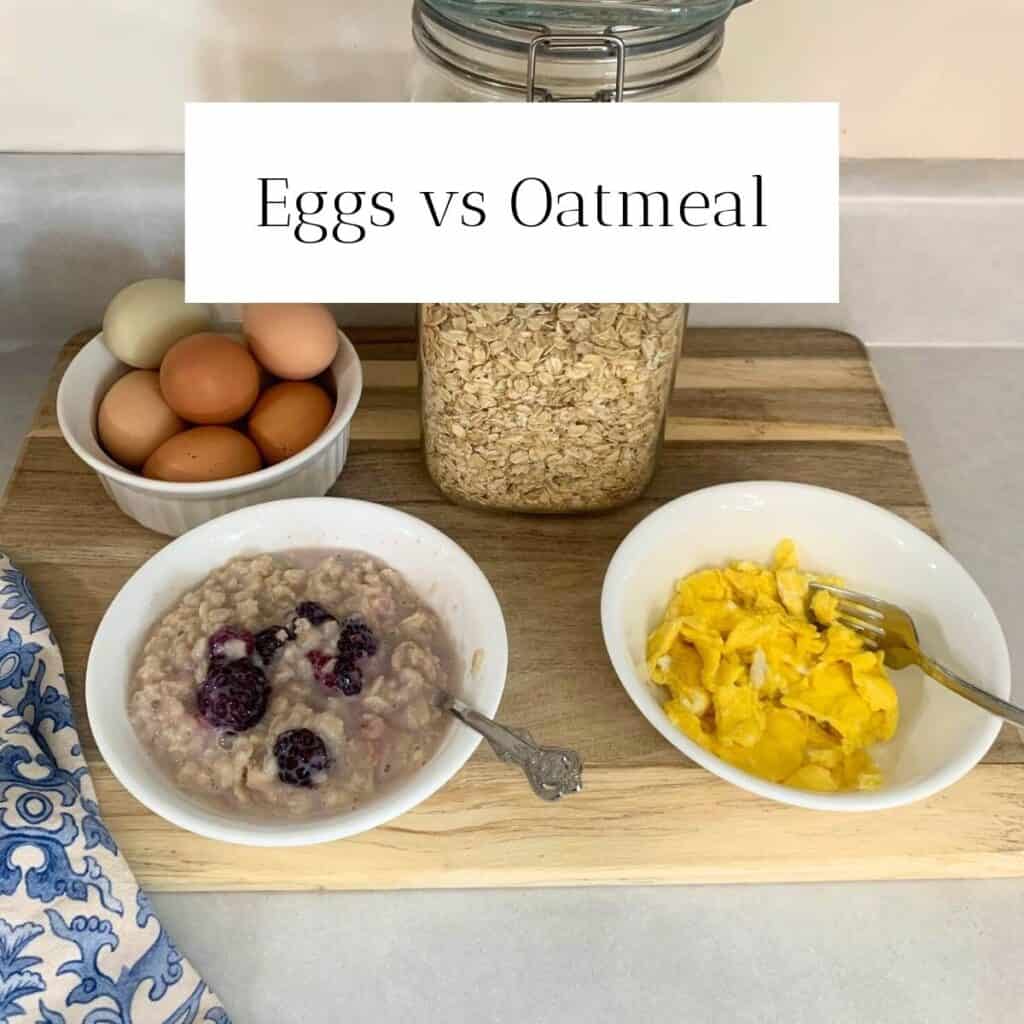
I take breakfast very seriously here at our farm. Well, I also take lunch and dinner seriously, too. But breakfast is special because it sets the tone for the whole day.
During my good weeks, I will ask the kids what they want for breakfast at the beginning of the week. Then I’ll make a plan to fix their special breakfast when it’s their turn. On busy days…well, you get what you get and you don’t pitch a fit.
We don’t buy boxed breakfast cereals, though. Even though it’s marketed as “convenient,” I’m concerned about the GMOs (genetically modified organisms) in the ingredients.
I want to give my family a healthy breakfast that tastes good and provides optimal health!
Watch out for GMOs in your food.
GMOs are identified on processed food labels beneath the nutrition facts by the following phrase: “Contains a bioengineered food ingredient.” Food companies may also use an electronic QR code or digital link to indicate that it has GMO ingredients.
The Non-GMO Project label has a new look and companies voluntarily add an orange butterfly on a green blade of grass to depict that the food does not contain any GMO ingredients.
What’s wrong with genetically modified foods?
The Journal of Food Science and Technology reported the following in its December 2013 publication:
“The biggest threat caused by genetically modified foods is that they can have harmful effects on the human body. It is believed that consumption of these genetically engineered foods can cause the development of diseases which are immune to antibiotics.”
We try to avoid food with chemicals and ingredients that have been genetically modified. Specifically, we follow the 80/20 principle where we eat healthy food 80% of the time and don’t worry too much the other 20% of the time. Do your own research and use your judgment for what you feed your own family, though.
Eggs vs Oatmeal: Which one is healthier for breakfast?
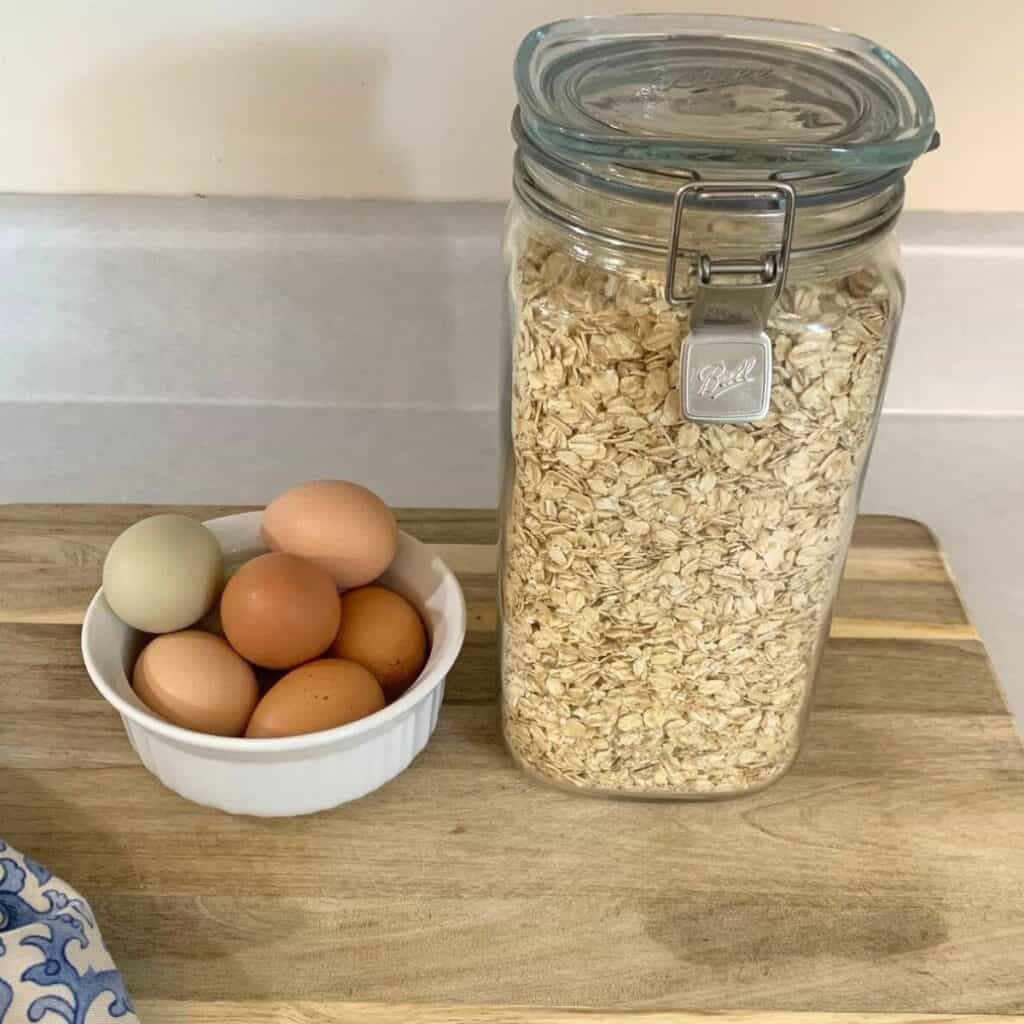
When it comes to breakfast foods, both whole eggs and oatmeal are a better choice compared to popular breakfast options like donuts, pastries, sugary cereals, or skipping breakfast.
The Center for Disease Control in the United States reported that between 2013–2016, 49.1% of adults tried to lose weight in the previous 12 months with more women (56.4%) than men (41.7%) trying to lose weight.
It has been suggested that high egg intake is associated with an increased risk of type 2 diabetes. That’s because eggs have high cholesterol (about 200 mg of cholesterol per egg), and cholesterol content has been related to increased blood glucose levels.
However, eggs contain various beneficial nutrients such as vitamins, minerals, proteins, and fatty acids, in addition to nutrients considered detrimental to health such as saturated fats and cholesterol. In my opinion, not all eggs are created equal; farm eggs from free-range chickens are healthier eggs.
Whole grains like oatmeal are high in dietary fiber and other nutrients. Low-carb diet advocates wrongly lump all carbohydrates together. However, there is a major difference between whole grains that include the bran, endosperm, and germ, and refined carbohydrates like white bread, white rice, and pasta.
Health benefits of eating eggs.
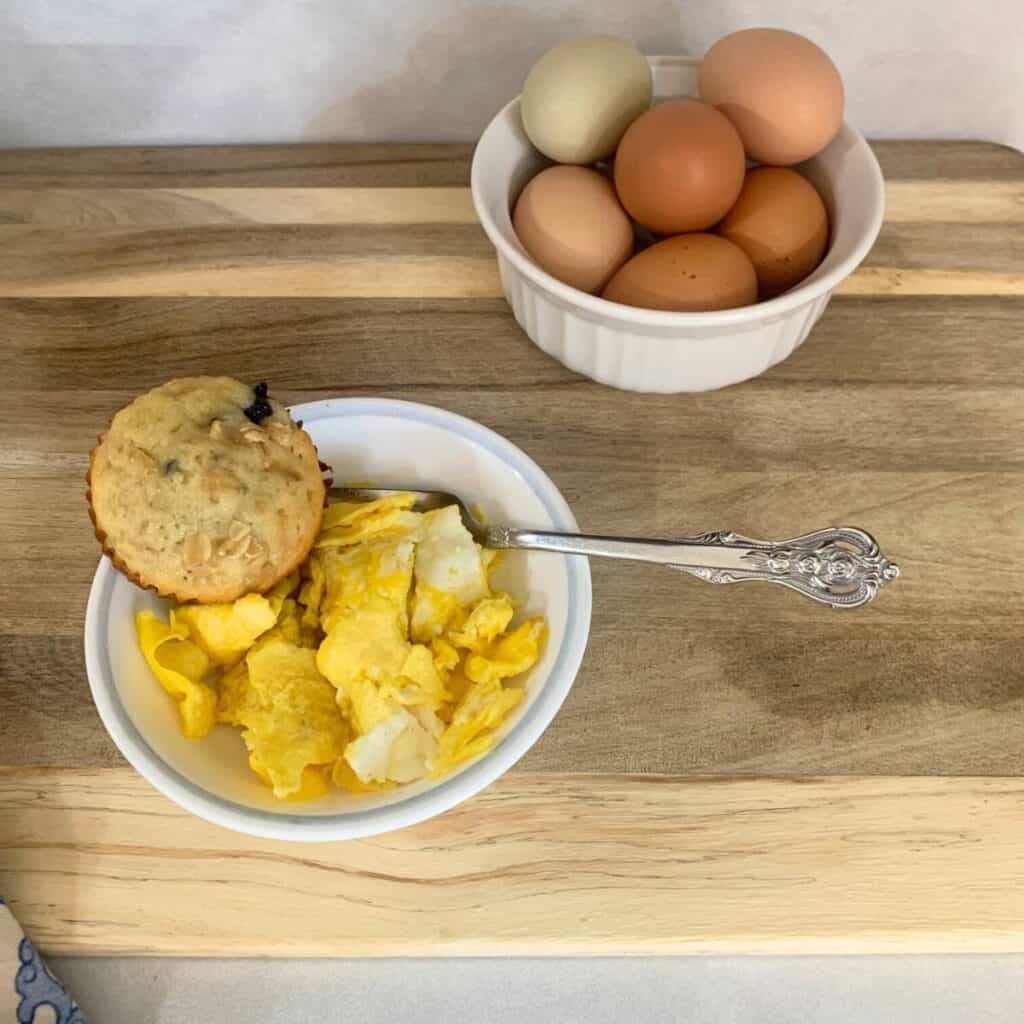
Eggs contain high quality protein, vitamins, minerals, and antioxidants.
A study published in the journal Nutrition Research in February 2010 showed eating one egg per day reduced insulin resistance and contributed to higher weight loss associated with increased satiety.
Additionally, study participants (men aged 20 to 70 years old) in the trial consumed fewer kilocalories (or 1,000 calories) in the 24 hours after eating an egg breakfast compared to those who ate a bagel for breakfast.
The International Journal of Environmental Research and Public Health published results of a crossover study in August 2020. The study investigated the energy intake and subjective sensations of hunger in overweight Australian adults after they ate a breakfast meal of eggs compared with a breakfast meal of cereal.
On two separate days, fifty overweight or obese participants consumed one of two isoenergetic breakfasts (1800 kJ) of eggs and toast or cereal with milk and orange juice. One week later, they ate the alternative breakfast for two days.
The study showed that the participants ate less following the egg breakfast compared to the cereal breakfast. Furthermore, participants felt less hungry after the egg breakfast and hunger returned more quickly after the cereal breakfast.
The Nutrition Research and Practice published a study in 2018 of over 7,000 Korean adults observed over a 14-year period. None of the participants were diabetic patients at the start of the study and 857 (442 men and 415 women) developed type 2 diabetes over the next 14 years.
Results showed that men who ate two to four servings of eggs per week had a 40% lower risk of developing type 2 diabetes than men who ate one serving or less per week. There were no significant differences in women who consumed or didn’t consume eggs and type 2 diabetes.
Health benefits of eating oatmeal.
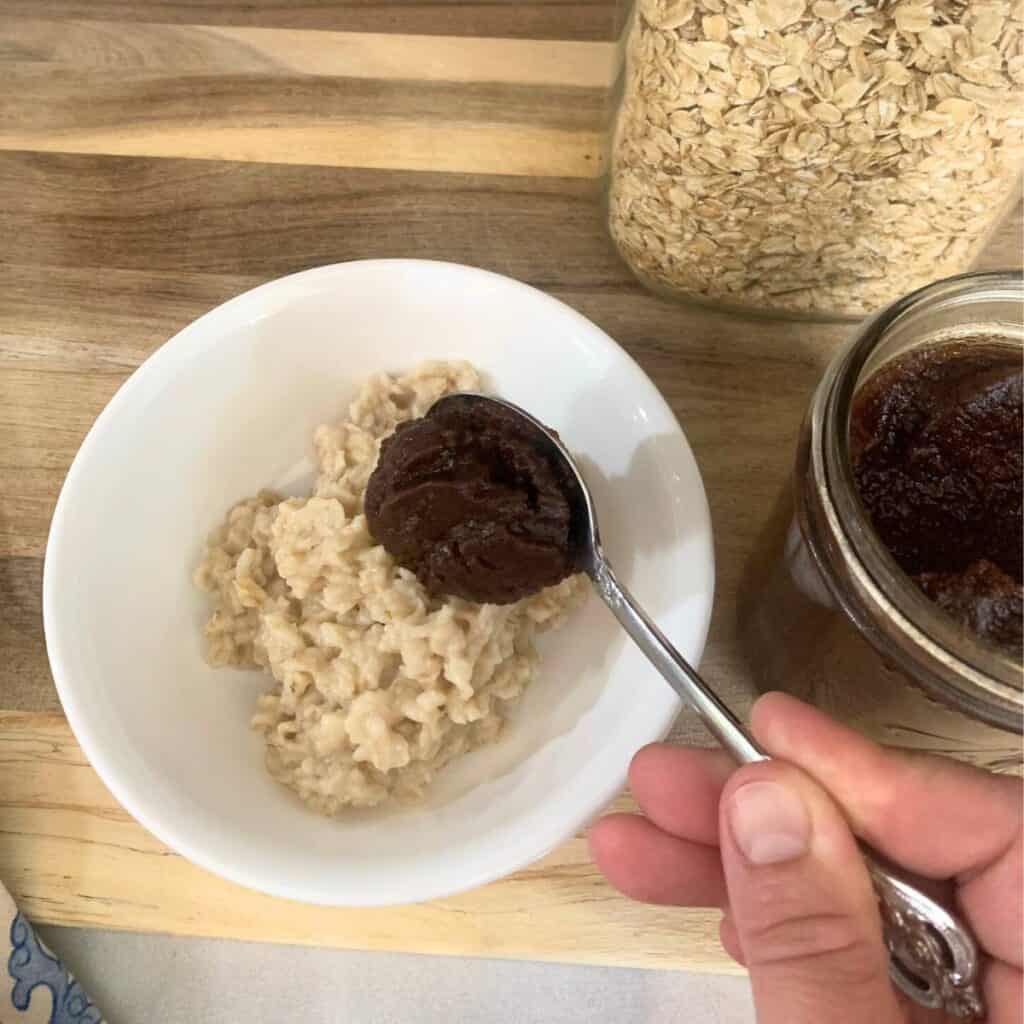
The consumption of whole grains like oatmeal has been associated with a modestly reduced risk of cardiovascular disease (CVD), type 2-diabetes, ischemic stroke, and obesity in adults.
Oatmeal is made from milled, steel-cut oats, or rolled oat grains. Some instant oatmeal products are also fortified with iron and B vitamins. Therefore, a bowl of oatmeal is considered to be part of a healthy diet.
The journal Foods published a study in 2021 detailing the health benefits of eating oats. Beta-glucan is an important component of dietary soluble fiber found in oat grains. It is the major active compound in oats with proven cholesterol-lowering and antidiabetic effects.
Oats have been determined to be beneficial for human health because they promoe immunomodulation and improve gut microbiota. In addition, oat consumption assists in preventing diseases such as atherosclerosis, dermatitis, and some forms of cancer.
High levels of serum cholesterol and low-density lipoproteins (LDL) are known to increase the risk of CVD. The consumption of oats, however, was shown to reduce serum total cholesterol and LDL cholesterol, thereby reducing the risks of CVD.
Previous studies show that beta-glucan-rich oats or oat-based products in a diet significantly lower cholesterol and blood pressure by regulating insulin metabolism in a mild hypercholesterolemia patient.
Nutrition Comparison of Eggs vs Oatmeal
Numerous studies have shown that eating a breakfast consisting of eggs is a good choice. High-quality protein first thing in the morning is the best way to decrease the number of calories you will eat later in the day.
And if your chickens happen to be free-range, they have easier access to all the bugs and seeds that nature intended for them to eat. That in turn increases the health benefits!
Oatmeal has less fat and slightly more protein than eggs with a good amount of micronutrients. On the other hand, eggs have fewer carbohydrates.
| Fresh, Raw Egg (100 g) (about 2 large eggs) | Whole Grain Rolled Oats (100 g) | |
|---|---|---|
| Protein | 12.6 g | 13.5 g |
| Total lipid (fat) | 9.51 g | 5.89 g |
| Carbohydrate | 0.72 g | 68.7 g |
| Fiber, total dietary | 0 g | 10.4 g |
| Calcium | 56 mg | 46 mg |
| Iron | 1.75 mg | 4.34 mg |
| Magnesium | 12 mg | 126 mg |
| Phosphorus | 198 mg | 387 mg |
| Potassium | 138 mg | 350 mg |
| Vitamin A, IU | 540 IU | not listed |
| Cholesterol | 372 mg | not listed |
| Folate | 47 ug | 32 ug |
| Choline | 294 mg | not listed |
| Lutein + zeaxanthin | 503 ug | not listed |
| Vitamin E (alpha-tocopherol) | 1.05 mg | not listed |
| Fatty acids, total saturated | 3.03 g | not listed |
| Fatty acids, total monounsaturated | 3.66 g | not listed |
| Fatty acids, total polyunsaturated | 1.91 g | not listed |
Does eating eggs increase your risk of heart disease?
No, eating eggs does not increase the risk of heart disease for young, healthy individuals. Eating eggs contributes to feeling full and eating less throughout the day.
A study published in 2017 by MDPI (Multidisciplinary Digital Publishing Institute) concluded that for a young healthy population, eating two eggs per day did not adversely affect the biomarkers associated with CVD risk. Additionally, study participants had better satiety (the feeling of being full) throughout the day.
Results of the study showed no difference in the LDL/HDL ratio, which is a recognized biomarker of CVD risk. Additionally, there was no difference in the plasma glucose, triglycerides, or liver enzymes.
How to Make Oatmeal on the Stove
I like using rolled oats (old-fashioned oats) in recipes and for oatmeal. I like the texture better than using quick oats which are thinner. I think the flavor is better, too.
Alternatively, you can store and use oat groats, which are the oat seed with the husk removed. You can roll them or crack them when you’re ready to use them by using a rolling pin or grain mill.
Here’s how I make oatmeal on the stove.
You can either cook raw oats on the stove (takes less than 20 minutes) or you can soak the oats overnight and cook them on the stove in the morning (takes less than 5 minutes) for additional benefits.
You’ll need a large pot, measuring cups, and a wooden spoon or spatula. You’ll also need rolled oats and water. Add some fine sea salt to the water to add a bit of flavor.
Overnight Oats
Soaking oats overnight increases their beneficial effects. It’s a better breakfast option than cooking oats all at once in the morning, if you planned ahead.
The process for cooking oats is the same regardless of whether you soaked the oats or not. Here I’ll share the process for soaking oats overnight.
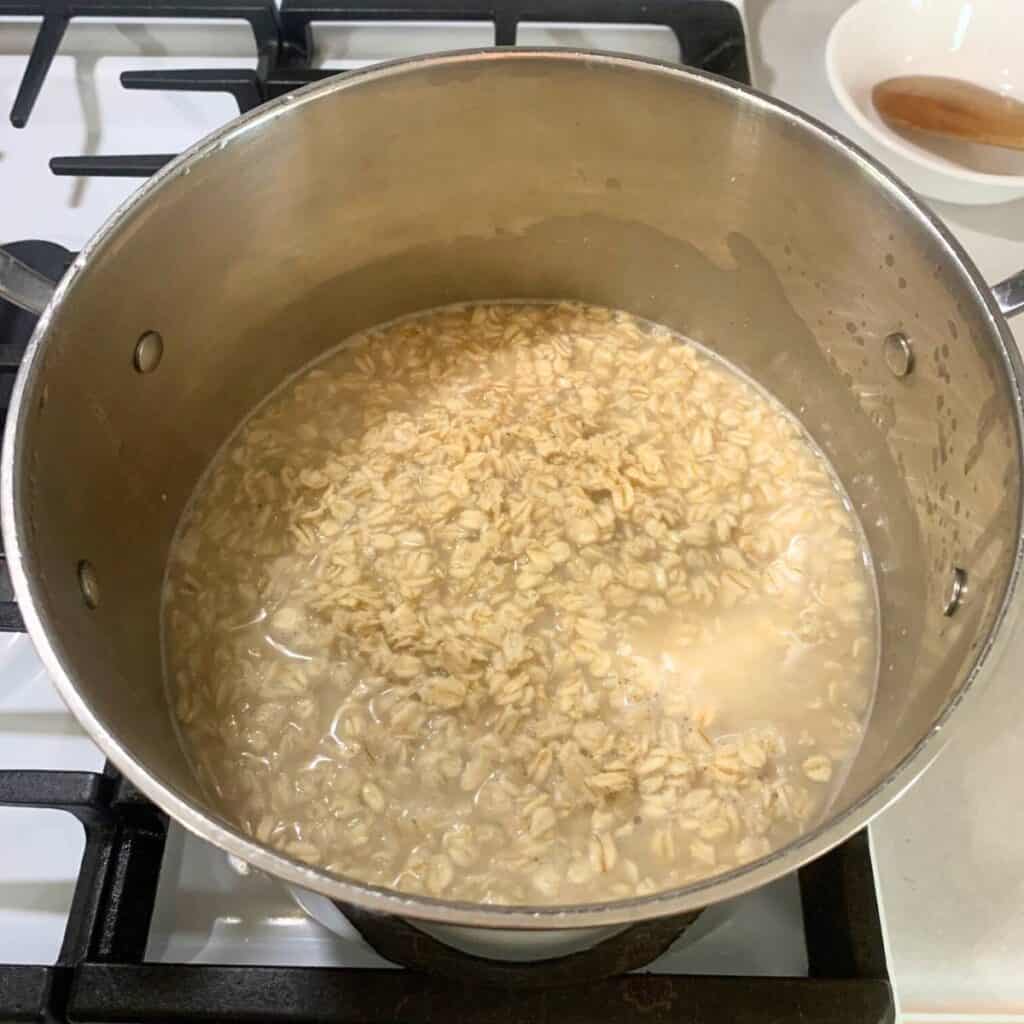
For every one cup of oats, you’ll need to add one cup of warm, filtered water. You can also add 2 tablespoons of whey, yogurt, kefir, or buttermilk to your water mixture. If you have milk or dairy allergies, use lemon juice or vinegar.
Cover the oats and let it rest in a warm place overnight, or for 7 to 24 hours.
The next morning, bring another cup of water to a boil on the stove. Then add 1/2 teaspoon of sea salt and the soaked oats.
Cover and reduce the heat to simmer the oatmeal for 2 to 3 minutes. Then remove it from the heat and stir in any additional ingredients.

Optional Ingredients to Add to Oatmeal
I like to add raw milk to cooked oatmeal to give it a creamy texture.
Some in my family like to keep it simple and just add milk, organic sugar, and some fresh or frozen fruit.
I like to add milk, mashed banana, and some homemade apple butter to my oatmeal. It’s a great flavor combination for fall and winter because of all the warming spices like cinnamon, allspice, and cloves!
I share how I make apple butter in this post!
Recipe Card for Overnight Oats
Oatmeal via Overnight Oats
Equipment
- large pot with lid
- bowl with lid
- measuring cups
- measuring spoons
- wooden spoon
Ingredients
- 1 cup warm, filtered water
- 2 tbsp whey, yogurt, kefir, or buttermilk (can also use vinegar or lemon juice)
- 1 cup rolled or cracked oats
- 1 cup boiling water
- 1/2 tsp fine sea salt
- milk (optional)
- apple butter (optional)
- fresh or frozen fruit (optional)
Instructions
- Mix 1 cup of rolled oats and 1 cup of warm, filtered water together in a bowl. Add 2 tablespoons of acid such as buttermilk, whey, yogurt, lemon juice, or vinegar. Mix well, cover, and let sit in a warm place overnight or up to 24 hours.
- The next morning, bring 1 cup of filtered water and 1/2 teaspoon of sea salt to a boil on your stove in a large pot.
- Add the soaked oats to the boiling water, reduce heat, cover, and simmer for up to 3 minutes, stirring occasionally.
- Then take the pot off the heat and add in any additional ingredients you desire. Options include milk, fresh or frozen fruit, sugar, maple syrup, and fruit butters. Mix well and serve while still warm.
Eggs vs Oatmeal: Final Thoughts
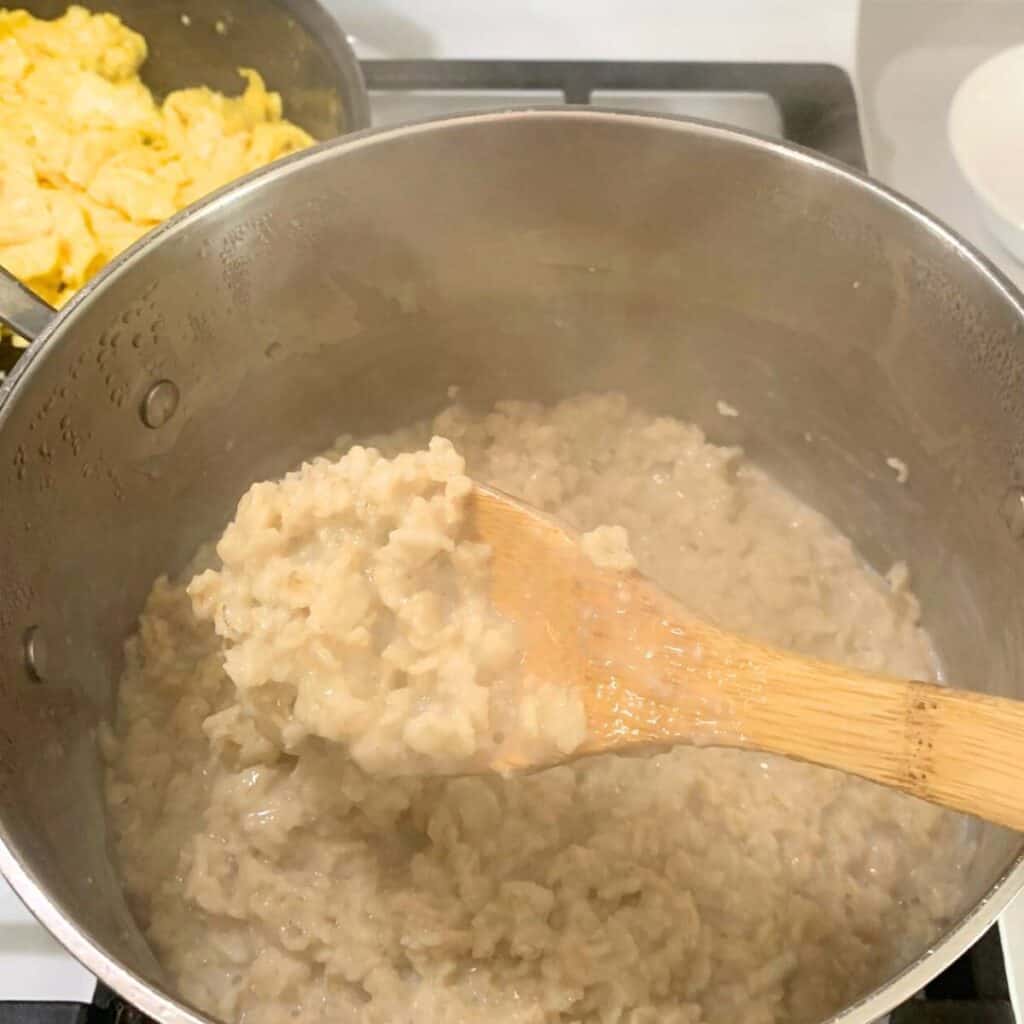
The best breakfast option is the one that you’ll actually eat. There is value in eating eggs for breakfast a few days per week. There is also value in eating oatmeal for breakfast a few days per week.
If you have access to fresh eggs, make hard-boiled eggs or a vegetable omelet if you get tired of eating scrambled eggs. I would personally avoid eating just the egg whites, though. The egg whites are full of lean protein but the egg yolks are where all the other nutrients are.
Alternatively, change things up by making a heart-healthy oatmeal breakfast.
If you want to pair your breakfast with delicious, organic, homemade hot chocolate (without milk), check out this blog post! It’s so simple to make this mix.
If you need a quick breakfast, stovetop oatmeal takes less than 20 minutes to make from start to finish. You can also customize it with fresh fruit, maple syrup, or brown sugar.
Be intentional about what you eat and feed to your family. Avoid breakfast foods that have a higher glycemic index like donuts and pastries.
I hope you found this post helpful!
Pin It For Later!
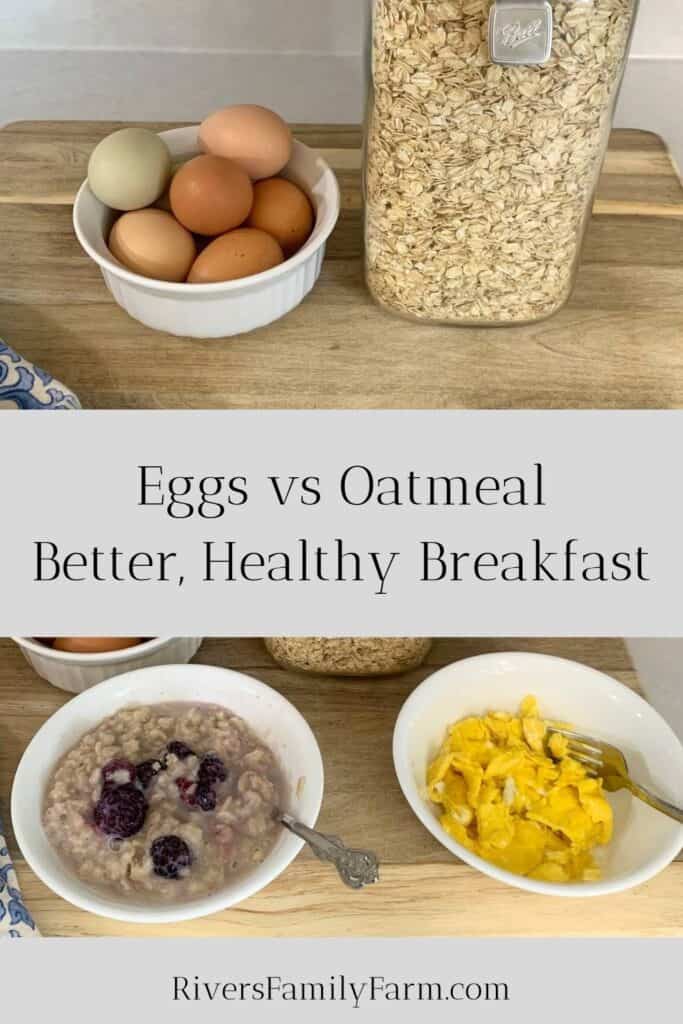
Other Related Posts
Cook Eggs in a Cast Iron Skillet Without Sticking


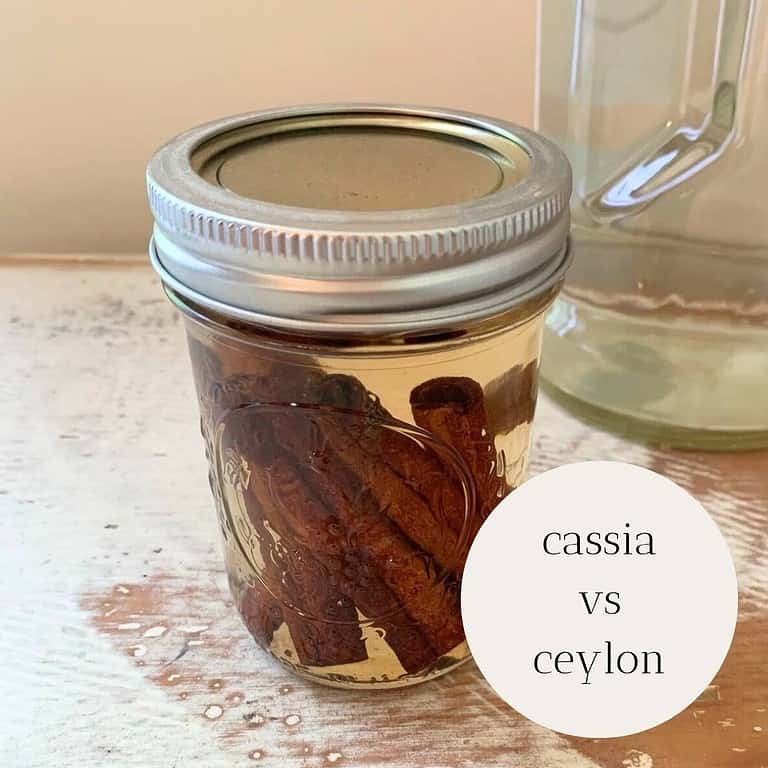
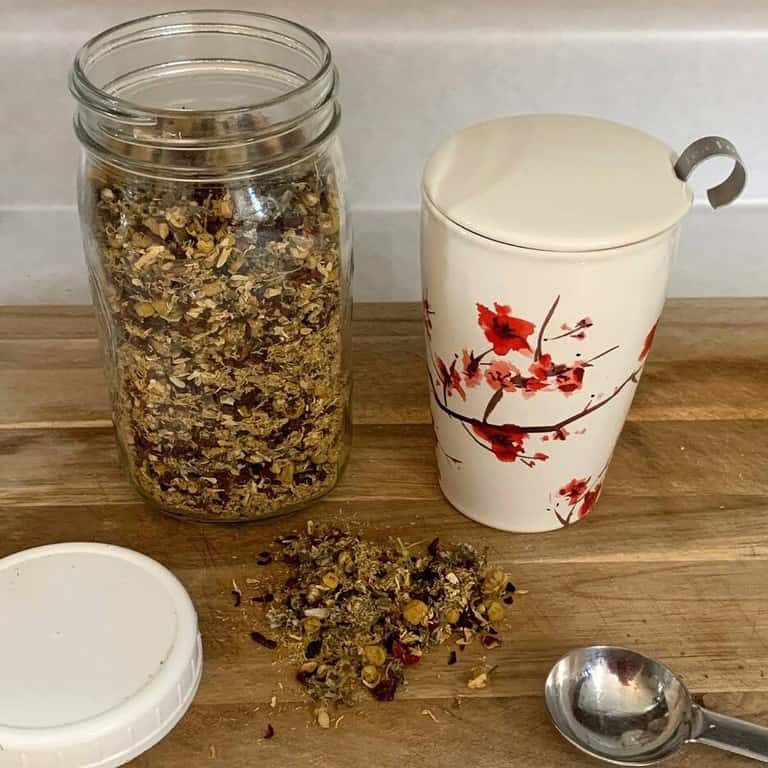
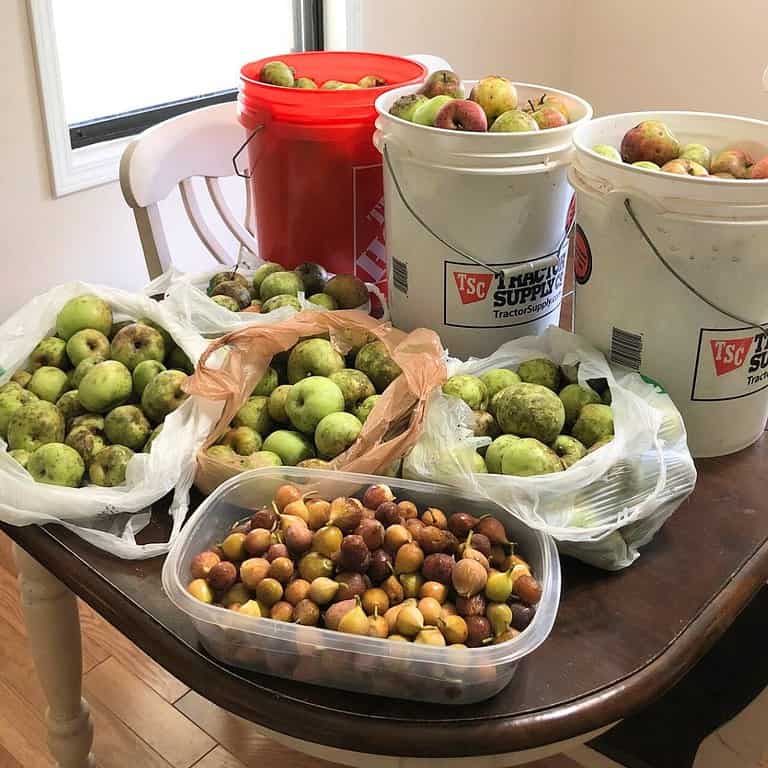


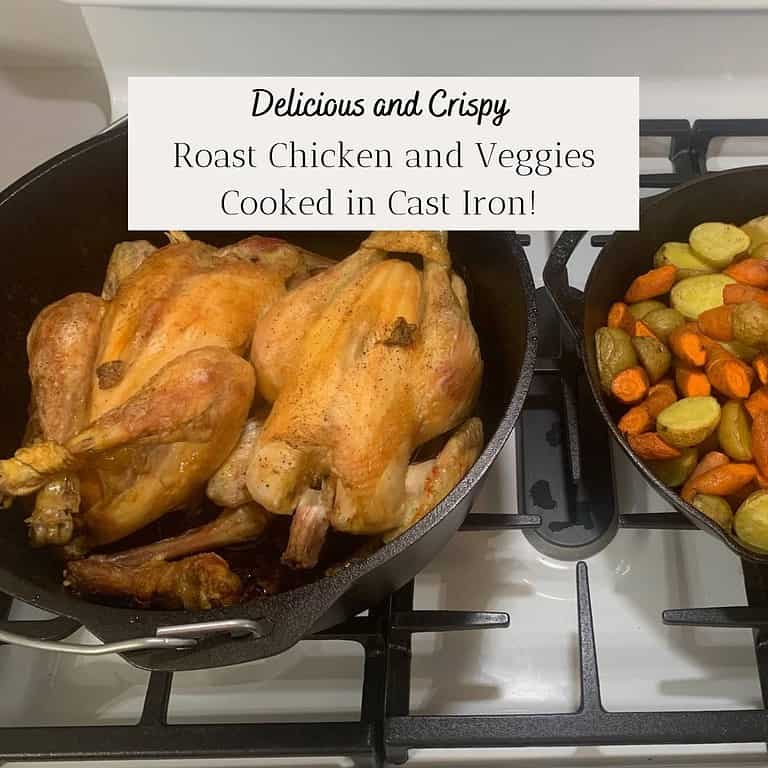
Yum this looks so good!!
Looks delicious! I have been on a journey of eating better. Eating eggs or oatmeal topped with raw honey or fresh fruit in the mornings. I agree about the box cereals, there is so much crap in them! Great post! Btw, I will have to try apple butter in my oatmeal, never had it that way!